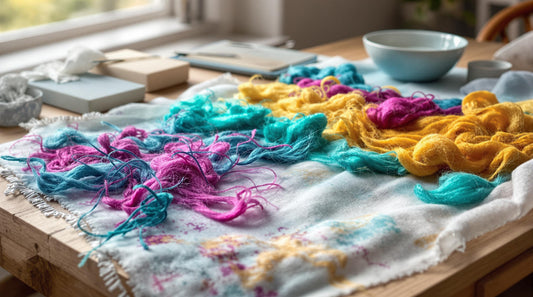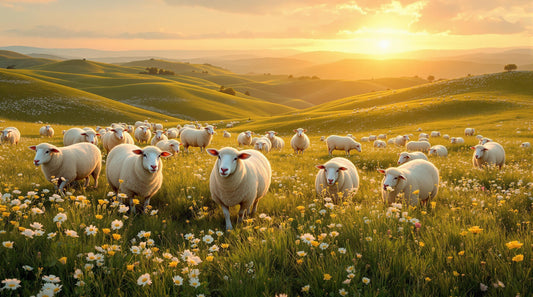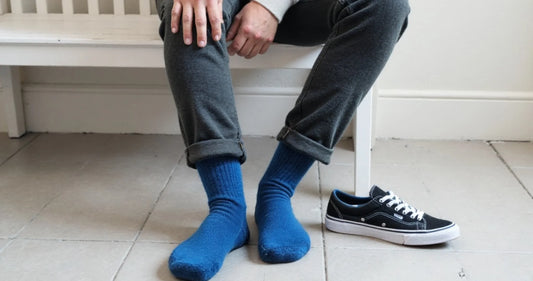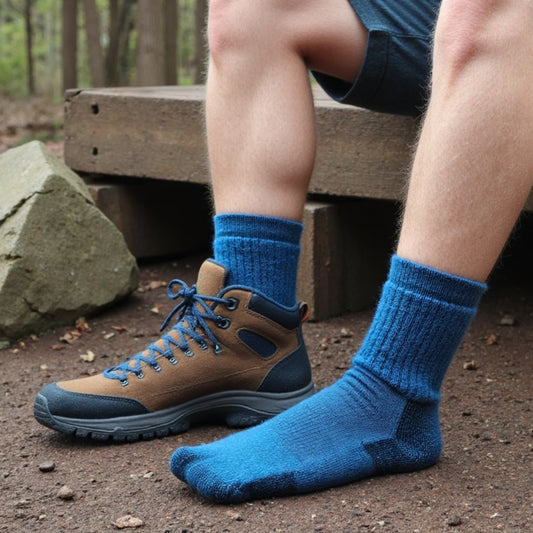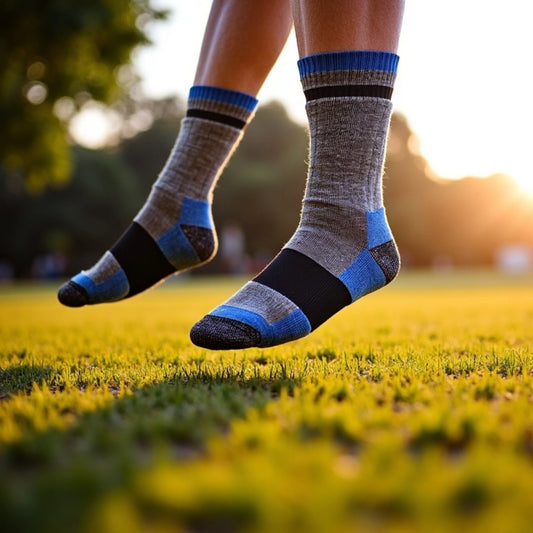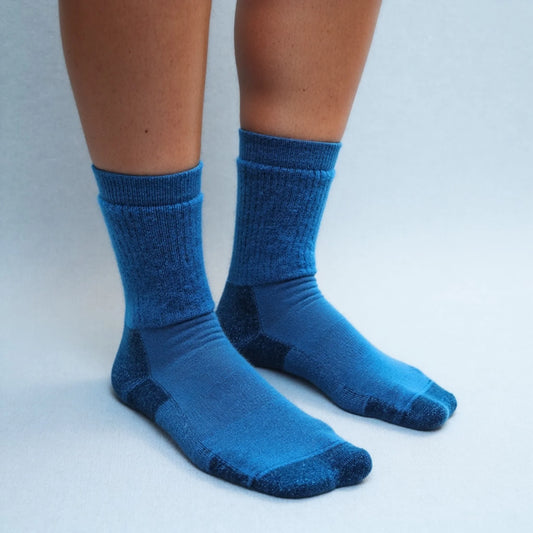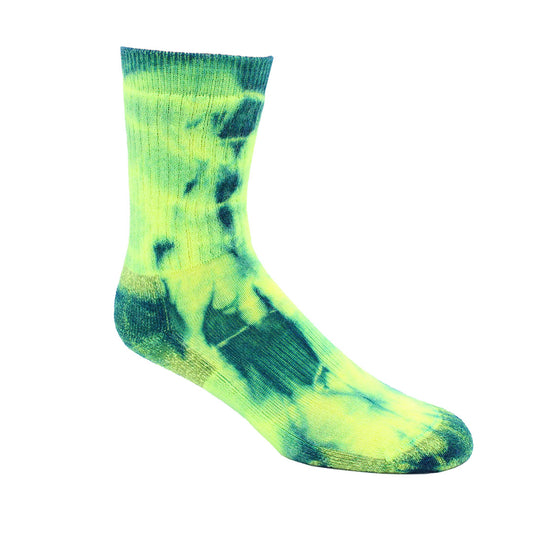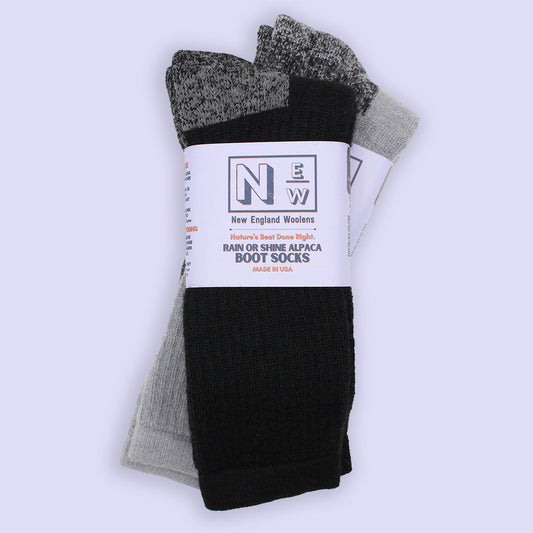Alpaca and Merino wool socks keep feet dry and warm due to their unique fiber structures:
-
Alpaca Fiber:
- Semi-hollow fibers trap heat
- Absorbs 11% of its weight in moisture
- Maintains thermal properties dry or wet
- Hypoallergenic and lanolin-free
- 3x warmer than Merino
- Merino wool:
- Crimped fibers create insulating air pockets
- Absorbs up to 30% of its weight in moisture
- Contains lanolin, has higher scale heights, may irritate sensitive skin
- Good temperature regulation
Both Alpaca and Merino Wool wick moisture and fight odor-causing bacteria.
Related video from YouTube
Quick Comparison
| Feature | Alpaca Wool | Merino Wool |
|---|---|---|
| Warmth | Higher | Good |
| Moisture Wicking | Fast-drying | Higher capacity |
| Allergens | None | Contains lanolin |
| Durability | Higher | Good |
| Price | More expensive | More affordable |
| Availability | Limited | Widely available |
Choose alpaca for extreme cold or sensitive skin. Pick Merino for athletic, sweaty activities.

1. Alpaca Fiber Basics
Alpaca fiber or wool isn't just soft and cozy - it's a high-tech fiber that nature designed. Let's break down why it's so good for your feet.
Fiber Build
Alpaca wool has a secret weapon: tiny air pockets. Each fiber is hollow inside, trapping heat like a mini thermos. This means your feet stay warm without the bulk.
Here's something cool: Royal Alpaca fibers are super thin - less than 19 microns across. That's why they feel as soft as the fanciest cashmere.
Did you know that individual alpaca fibers have lower scale heights (the proteins that make up the outside layer of the fiber), so they feel even softer than their measured micron?
If you compare a 20-micron alpaca fiber to a 20-micron merino wool fiber, the alpaca will feel up to 3 to 5 microns softer to the touch!
How It Handles Sweat
Sweaty feet? No problem. Alpaca wool is like a sponge for moisture. It can soak up 10-11% of its weight in sweat without feeling wet. Compare that to merino wool, which holds about 30%.
"Alpaca fiber naturally locks in warmth when you need it and releases it when you don't, making it a great choice for every season." - Forbes Vetted
This sweat-wicking superpower keeps bacteria (and stinky odors) at bay. Your feet stay fresh, even after a long day.
The lower scale height mentioned earlier also contributes to alpacas' hypoallergenic properties because odor-causing bacteria have fewer places to hide and flourish.
Heat Control
Alpaca wool is like a smart thermostat for your feet. Those hollow fibers don't just trap heat - they can let it escape when things get too toasty. It's why alpaca socks work year-round.
Get this: alpaca insulates up to three times better than other wools. Your feet stay cozy in the cold, but won't overheat when you're active. Because the fibers act like natural insulation, you can achieve the same level of temperature regulation and comfort without excess bulk.
Feel on Skin
If you've got sensitive skin, alpaca wool is your new best friend. It doesn't have lanolin like sheep's wool, so it's less likely to cause itching or allergies.
The fibers are smooth, too. That means no scratchy feeling, even if you wear the socks all day. Hikers and skiers love this comfort for long adventures.
Want to try alpaca socks yourself? Try our best sellers: All Day Alpaca Crew Socks , and join over 50,000 other happy feet! They're a great way to experience the comfort and performance of this amazing fiber and are a great, all occasion, all terrain sock.
sbb-itb-b77f5dc
2. Merino Wool Basics
Merino wool isn't your grandma's itchy sweater material. It's nature's answer to high-tech performance fabric. Here's why it's a game-changer for socks:
Fiber Build
Picture this: Merino fibers are so fine, they make a human hair look chunky. That's why they feel buttery-soft against your skin. No scratch, no itch.
But here's the kicker: these fibers are naturally wavy. This creates tiny air pockets that work like magic. They trap heat when it's cold and let your skin breathe when it's hot. It's like your feet have their own personal climate control.
Sweat Management
Merino wool is the heavyweight champ of moisture management. It can soak up 35% of its weight in sweat before you even feel damp. That's WAY more than your average synthetic sock.
But wait, there's more:
"Merino will have you going farther and faster without sacrificing comfort, and your body will thank you." - Double U Hunting Supply
Merino fibers are like tiny water pumps. The outside repels water, while the inside loves it. This combo sucks sweat away from your skin and releases it as vapor. Say goodbye to soggy, blister-prone feet on long hikes.
Temperature Control
Remember those air pockets? They're not just for show. In the cold, they're cozy heat traps. But when things heat up, Merino adapts.
It wicks away sweat and lets excess heat escape. That's why Merino socks work for both winter skiing and summer trail running. Your feet stay comfy, no matter the weather.
Skin-Friendly
If you've sworn off wool because it feels like wearing a cactus, Merino will change your mind. These fibers are so flexible, they can bend 30,000 times without snapping. That means your socks keep their shape and stay comfy all day.
Plus, Merino naturally fights odor-causing bacteria. Your feet (and your hiking buddies) will thank you after a multi-day trek.
Want to experience Merino magic for yourself? Check out New England Woolens' ECO-TRAIL MERINO WOOL HIKER SOCKS. At $18.00 USD, they blend Merino wool with recycled nylon for the perfect mix of comfort and toughness.
Strengths and Limits
Alpaca and merino wool both keep your feet dry and warm, but they've got their own tricks up their sleeves. Let's see how they stack up:
Warmth and Insulation
Alpaca wool is the warmth champion. Why? It's got hollow fibers that trap heat like tiny thermoses. Your toes will thank you in freezing weather.
Merino wool? It's no slouch either. Its natural crimp creates heat-trapping air pockets. It's a solid choice for various temperatures.
Moisture Management
Both wools are moisture-wicking superstars, but they play the game differently:
- Alpaca wool: Soaks up 11% of its weight in moisture
- Merino wool: Absorbs up to 30% of its weight
What does this mean for your feet? Alpaca dries faster, keeping your feet drier during sweaty activities. Merino can handle more sweat before feeling damp, but takes longer to dry out.
Comfort and Allergies
Got sensitive skin? Alpaca's your new best friend. It's naturally hypoallergenic and lanolin-free. Merino, while soft, contains lanolin that might irritate some people.
"Alpaca fiber naturally locks in warmth when you need it and releases it when you don't, making it a great choice for every season." - Forbes Vetted
Durability and Strength
Alpaca fibers are tough as nails. Their tensile strength is 50, compared to merino's 30-40. Translation? Alpaca socks are less likely to wear out quickly, especially in high-friction spots like heels and toes.
Merino's still durable, but it's more prone to pilling and might need replacing sooner.
Environmental Impact
Both wools are biodegradable, but alpaca production generally leaves a smaller footprint. Alpacas are gentle grazers and need less land and resources than sheep.
Price and Availability
Here's where merino often wins. It's easier to find and usually cheaper. For example:
- ECO-TRAIL MERINO WOOL HIKER SOCKS by New England Woolens: $18.00 USD
- All Day Alpaca Crew Socks: $24.00 USD
Alpaca socks tend to cost more due to limited production.
Quick Comparison
| Feature | Alpaca Wool | Merino Wool |
|---|---|---|
| Warmth | Top-notch (hollow fibers) | Very Good |
| Moisture Wicking | 11% absorption, dries fast | Up to 30% absorption, slower drying |
| Hypoallergenic | Yes | No (contains lanolin) |
| Durability | Higher (strength 50) | Good (strength 30-40) |
| Price | Usually higher | More budget-friendly |
| Availability | Limited | Widely available |
Which Wool to Choose
Stuck between alpaca and merino wool socks? Let's break it down:
Extreme cold? Pick alpaca. Its hollow fibers trap more heat, making it about 3x warmer than merino. Perfect for winter expeditions or cold-weather camping.
Sensitive skin? Alpaca wins again. It's hypoallergenic and lanolin-free, unlike merino which can bug some people. Try New England Woolens' All Day Alpaca Crew Socks ($24.00 USD) if your skin's picky.
Sweaty feet? Merino's your friend. It soaks up 30% of its weight in moisture before feeling damp, while alpaca taps out at 11%. For high-intensity activities, check out New England Woolens' ECO-TRAIL MERINO WOOL HIKER SOCKS ($18.00 USD).
Want 'em to last? Go alpaca. With a tensile strength of 50 (compared to merino's 30-40), these socks won't quit on you.
Jack-of-all-trades? Merino's got you covered. It handles temperature changes like a champ and you can find it everywhere.
Eco-warrior? Both are solid, but alpaca edges out. These fluffy dudes need less land and resources than sheep.
"Choosing alpaca is not only a choice for comfort and performance but also a conscious decision for a more sustainable and eco-friendly textile industry." - Altera Alpaca Store
So, what's it gonna be? Cozy alpaca or versatile merino?


